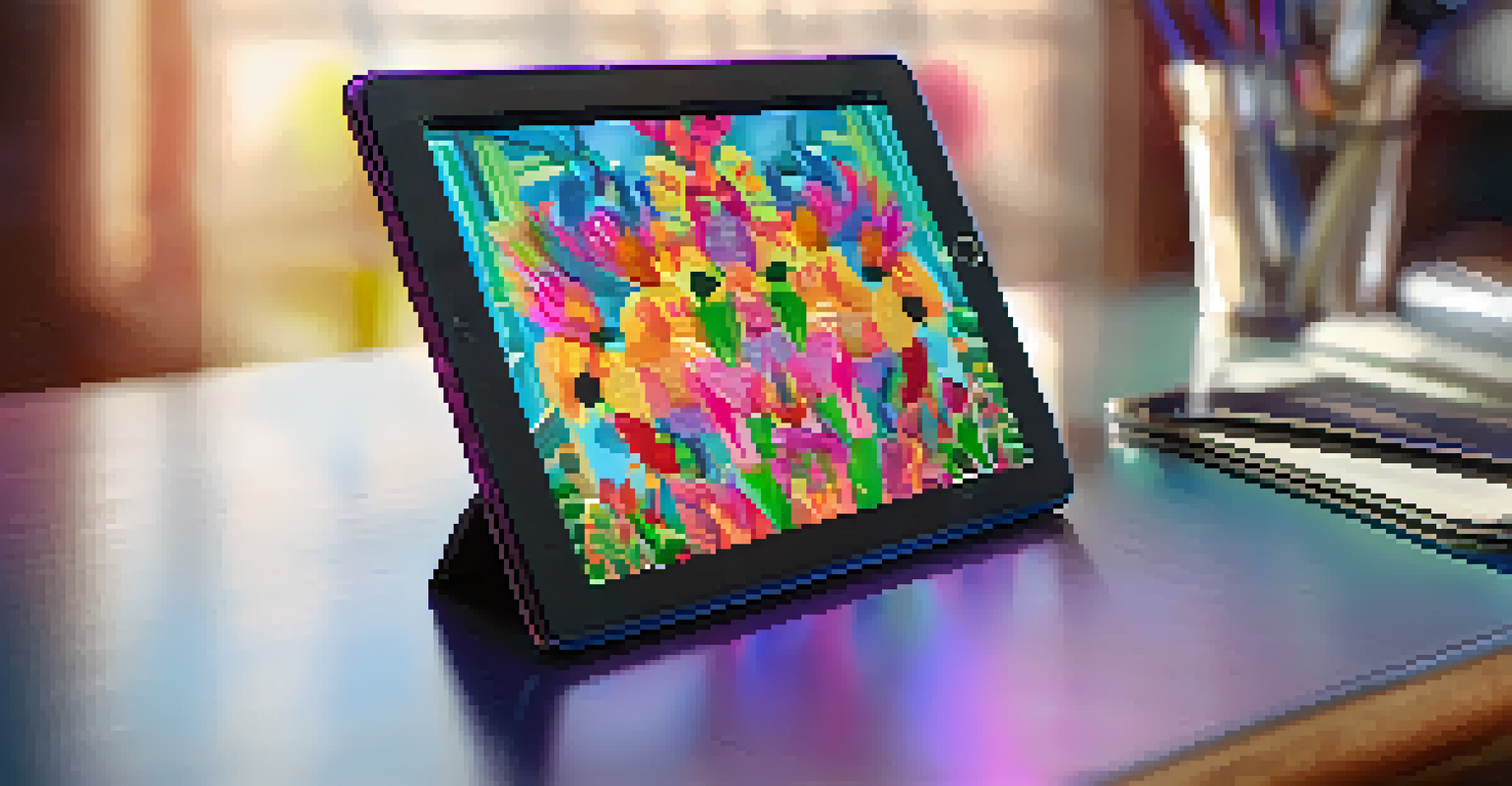Exploring the Intersection of NFTs and Digital Data Ownership

What Are NFTs and Why Do They Matter?
NFTs, or Non-Fungible Tokens, are unique digital assets verified using blockchain technology. Unlike cryptocurrencies, which are interchangeable, each NFT has distinct properties that make it one-of-a-kind. This uniqueness has sparked interest across various industries, from art to gaming, as it offers a way to own and trade digital items securely.
NFTs have the potential to revolutionize the way we think about ownership and value in the digital world.
What makes NFTs particularly compelling is their ability to establish digital ownership. Imagine owning a rare digital painting or a song; NFTs provide proof that you own the original, even if copies exist. This ownership model is a game-changer, as it allows creators to monetize their work in ways previously unimaginable.
As we delve deeper into the world of NFTs, it's essential to understand their implications. They not only represent ownership but also challenge traditional concepts of value and authenticity in the digital realm. So, how do NFTs intersect with digital data ownership, and what does this mean for creators and consumers alike?
Understanding Digital Data Ownership
Digital data ownership refers to the rights and control individuals or organizations have over their digital content. This includes everything from social media posts to digital art and personal information. With the rise of the internet, the question of ownership has become increasingly complex, as many users unknowingly relinquish rights to their content when they agree to terms of service.

At its core, digital data ownership is about having the ability to control how your data is used and shared. Consider the social media platforms that host your photos; while you upload them, the platforms often retain rights to display and use your content. This creates a disconnect between creation and ownership, leaving many creators feeling exploited.
NFTs Redefine Digital Ownership
NFTs provide a unique way to establish and verify ownership of digital assets, transforming how creators monetize their work.
As we explore the intersection of NFTs and digital data ownership, it becomes clear that NFTs can offer a solution. By linking digital assets directly to their creators, NFTs empower individuals to reclaim ownership and control over their digital creations. This shift could fundamentally alter how we think about and engage with digital content.
The Role of Blockchain in Data Ownership
Blockchain technology serves as the backbone for NFTs, providing a decentralized ledger that records ownership and transaction history. This transparency is crucial for establishing trust in digital ownership, as it allows anyone to verify the authenticity and provenance of an asset. Essentially, blockchain acts as a secure, tamper-proof record of ownership.
Blockchain technology is the key to ensuring digital ownership and authenticity in an increasingly digital age.
Imagine buying a piece of art; with traditional methods, proving its authenticity can be challenging. However, with an NFT, the blockchain keeps a detailed history of the artwork, including previous owners and sales. This not only enhances trust but also increases the value of the digital asset, as collectors can be confident in what they’re purchasing.
Moreover, blockchain opens up new possibilities for creators by enabling smart contracts—self-executing contracts with the terms directly written into code. These contracts can automatically enforce royalties, ensuring creators receive a percentage of sales every time their work is resold. This evolution of ownership models is a significant leap forward for digital creators.
Empowering Creators Through NFTs
One of the most exciting aspects of NFTs is their potential to empower creators. Artists, musicians, and writers can use NFTs to monetize their work directly without intermediaries. This direct-to-consumer model fosters a closer connection between creators and their audience, allowing fans to support their favorite artists in a tangible way.
For instance, musicians can release exclusive tracks as NFTs, providing fans with unique content that cannot be found elsewhere. This not only creates a new revenue stream but also enhances the overall fan experience. Imagine owning a limited edition song that only a few fans can access—it's a novel way to engage and reward loyal supporters.
Blockchain Ensures Trust
Blockchain technology underpins NFTs, offering a transparent and secure method to verify authenticity and ownership of digital items.
Additionally, NFTs enable creators to maintain control over their work. By issuing their pieces as NFTs, artists can dictate how their creations are used and ensure they receive credit and compensation. This level of control is crucial in an industry where copyright infringement is rampant, giving creators a much-needed sense of security.
Challenges Facing NFTs and Digital Ownership
Despite the advantages, the NFT landscape is not without its challenges. Issues such as environmental concerns surrounding blockchain technology and the volatility of NFT markets raise questions about sustainability. Critics argue that the energy consumption of certain blockchain networks contributes to climate change, making it essential for the industry to seek greener alternatives.
Moreover, the NFT market can be highly speculative, with prices fluctuating dramatically. This creates a risk for both creators and collectors, as what may seem like a valuable asset today could lose its worth tomorrow. Thus, potential buyers should approach NFTs with caution and conduct thorough research before investing.
Legal complexities also pose a challenge, as intellectual property laws struggle to keep pace with the rapid evolution of digital art and NFTs. As creators navigate this new terrain, understanding their rights and obligations becomes crucial. Addressing these challenges will be vital for the long-term success and acceptance of NFTs in the digital landscape.
The Future of NFTs and Digital Ownership
As we look to the future, the potential for NFTs to reshape digital ownership is immense. With ongoing advancements in technology, we may see new applications for NFTs that extend beyond art and collectibles. For example, NFTs could revolutionize how we approach identity verification, digital contracts, and even real estate transactions.
Imagine a world where your digital identity is secured by an NFT, allowing you to prove your identity across various platforms without the need for personal data sharing. This could significantly enhance privacy and security online, as well as streamline interactions in an increasingly digital society. The possibilities are exciting and expansive.
Challenges in the NFT Space
Despite their potential, NFTs face challenges including environmental concerns, market volatility, and legal complexities that must be addressed.
Ultimately, the evolution of NFTs and digital ownership will depend on collaboration among creators, technologists, and policymakers. By working together, we can establish frameworks that support innovation while protecting the rights of individuals. As this landscape continues to unfold, staying informed and adaptable will be crucial for everyone involved.
Conclusion: Embracing the New Digital Era
In conclusion, the intersection of NFTs and digital data ownership represents a transformative shift in how we view and interact with digital content. By leveraging blockchain technology, NFTs empower creators, redefine ownership, and challenge traditional notions of value. As we navigate this new digital era, understanding these concepts will be essential for anyone engaging with the digital landscape.
While challenges remain, the potential for growth and innovation is undeniable. The future holds exciting opportunities for creators and consumers alike, as we continue to explore the myriad ways NFTs can enhance our digital experiences. Embracing this change will allow us to harness the full power of technology and creativity.

So, whether you're a creator looking to monetize your work or a consumer eager to support your favorite artists, now is the time to dive into the world of NFTs. With every new development, we inch closer to a more equitable digital landscape, where ownership and creativity can flourish hand-in-hand.